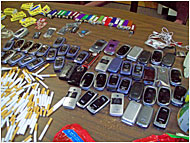In the latest development of a recurring controversy, the State of South Carolina has delivered a petition to the Federal Communications Commission seeking a waiver of the section of the Communications Act of 1934 that bans the jamming of telecommunications signals. The petition for this waiver is backed by the state’s Department of Corrections, which has been forced to deal with a spate of incidents arising from inmates’ use of cell phones smuggled into prisons. In fact, cell phones have become the most prized contraband in modern lockups. Resourceful, if not particularly admirable, inmates have used these modern conveniences to order “hits” on potential prosecution witnesses; to pursue credit card, drug, or extortion schemes; and to engineer escape plots. On Wednesday, July 15, the Senate Commerce Committee held hearings on proposed legislation (the Safe Prisons Communications Act of 2009) that would amend the 1934 law to allow the FCC to waive that section of the act thus permitting telecommunications jamming for prisons.Prisoner use of smuggled cell phones is one instance in which advances in technology, especially smaller, lighter instruments, has proved more of a bane than a blessing. Each year, prison officials confiscate thousands of phones smuggled in by visitors or dishonest guards, hidden in food shipments, or tossed over prison walls. One smuggler was reported to have resorted to using carrier pigeons. In total, officials from 26 states and three cities have signed the 40-page petition.To learn more, or to access a link to the petition itself, go to the South Carolina Department of Corrections’ website.
Felons and Phones






